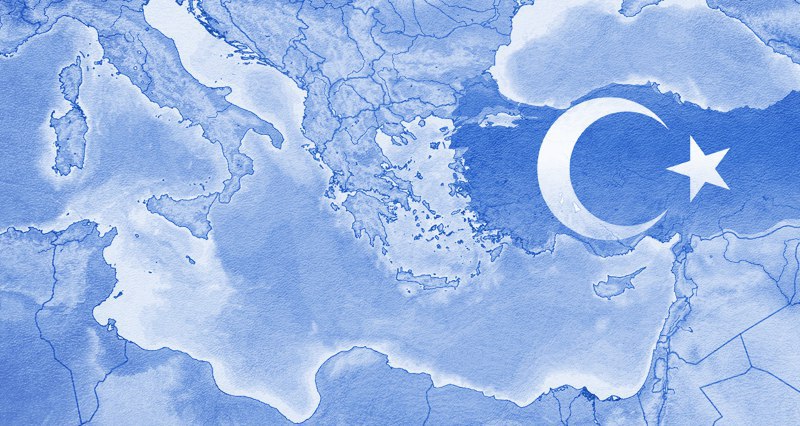On the morning of April 1, 2006, the Turkish delegation at the NATO headquarters in Brussels released a written statement to all alliance members announcing Turkey’s launch of the “Mediterranean Shield” naval operation to ensure energy security in the Eastern Mediterranean. The statement had the effect of an earthquake in NATO, as the alliance’s Active Endeavour Operation (OAE) had been underway in the same region already since October 16, 2001. Similar statements were made to world agencies through press releases from the Ministry of Foreign Affairs and the Turkish General Staff.
Within two years, Turkey had conducted two separate naval operations, in the north and then in the south, the military actions were code-named “Black Sea Harmony Operation” (BHO) and the “Mediterranean Shield”, respectively.
How did it start?
As the Head of the Naval Strategy Department, we first mentioned the idea and code-name of the operation “Mediterranean Shield” to the Commander in Chief of the Turkish Navy, Admiral Özden Örnek. The real reason behind this operation was the Greek Cypriot Administration’s illegal declaration of an EEZ on April 2, 2004, effective as of March 21, 2003. This decision encroached into Turkey’s continental shelf / EEZ. The University of Seville’s map, which was prepared for the EU, underpinned the declaration of the aforementioned area asserting illegal rights over roughly 150,000 km2 in the Turkish Blue Homeland. In those days, the deceptive prospect of Turkey’s non-starter EU membership was a carrot on a stick that created an aura of progress embroidered with and celebrated under pretentious fireworks in broad daylight of Ankara.
This was the period when FETÖ and the Euro-Atlantic influence were observed and experienced in all walks of politics from foreign affairs to domestic government. There was a desperate need for responsiveness to protect our Blue Homeland in the Eastern Mediterranean. Although the naval response was contemplated first in the spring of 2005, the actual field implementation was only able to take place 14 months later. When operation “Mediterranean Shield” commenced three months later on July 13, 2006, it coincided with the inauguration of Baku-Tbilisi-Ceyhan Oil Pipeline Project, as securing new energy routes over the Mediterranean became a prominent goal. The fight against terrorism, preventing the spread of weapons of mass destruction (WMD), and countering illegal activities at sea had been emphasized in the framework of UN Security Council resolutions 1373, 1540 and 1566. Joining the exercise were frigates, submarines, corvettes, fast-attack craft / missile boats and naval aviation units. Within the framework of “Mediterranean Shield”, there were plans to deploy frigates, tankers, and corvettes in port cities of Mersin (Turkey) and Gazimagusa (Cyprus).
Sledgehammer around the Corner
Roughly 3.5 years after the operation’s commencement, a prime reason of critique mentioned against Turkish Navy in the EU’s 2009 progress report was operation “Mediterranean Shield”. The EU did not wish to let Turkey protect its Blue Homeland in the Mediterranean. On page 32, section 2.3 of the report dated October 14, 2009, an article read: “The Turkish navy blocked civilian ships exploring oil on behalf of the Greek Cypriot Administration several times during the period covered in this report.” 4 months after its publication, 4 admirals on duty, including myself, were arrested during the ‘Sledgehammer plot.’ The first wave of arrests ended within a month. However, the real storm would hit on February 11, 2011 with incarceration rounds in Silivri. Imperialism and its collaborators in Turkey had effectively destroyed the Navy.
Mediterranean Shield Endures
Operation Mediterranean Shield nonetheless continued, albeit with a low profile, despite massive purges, morale collapse and substitution in command posts by FETÖ-affiliated admirals and officers after 2008. FETÖ’s strength in the Navy proved insufficient to stop an operation that so clearly aimed to protect our national interests and the Blue Homeland.
Even though this treacherous group attempted to confiscate not only Turkish Armed Forces but our national sovereignty during the failed coup attempt on July 15, 2016 on behalf of imperialism, the Turkish nation refused to bow down; instead it resisted, endured and won. If this coup had been successful, there is no doubt that operations “Mediterranean Shield” and “Black Sea Harmony” would have been abolished, leaving no other alternative than various NATO-endorsed operations.
The strengthening of our Navy post-2016
By purging FETÖ, our Navy re-gained strength and persisted in spite of imperialism, achieving great successes both in the Mediterranean and the Aegean since 2017. The Blue Homeland and Sea Wolf exercises in 2019 provided a powerful, protective base for Turkey’s successful seismic and drilling diplomacy at sea. Undoubtedly, the main impetus of this achievement was Operation Mediterranean Shield.
Thanks to this initiative, Turkey blocked attempted violations of our maritime zone by 14 vessels operating on behalf of the Greek Cypriot administration to conduct seismic search and drilling activity. Turkey has exhibited perhaps the most forceful display of naval and gunboat diplomacy in the world arena in recent years.
The Consensus on November 27 and the Mediterranean Shield
Developed by Rear Admiral Cihat Yaycı, the thesis for Turkey and Libya littorals culminated in the Memorandum of Understanding (MoU) on bilateral maritime demarcation on November 27, 2019, opening a new chapter in the Mediterranean. Owing to this memorandum, Turkey drew a large wedge between Greece, Greek Cypriot Administration, and Egypt, and gained a prominent legal acquis in support of its maritime law jurisdiction. In fact, a press statement on the web site “Enoplos” by the former member of Greece Intelligence Organization (KYP), Savvas Kalenderidis, a fluent Turkish speaker, explains everything: “Full implementation of the MoU between Turkey and Libya would be the end of Hellenism.” It seems there was no need to mention that the legal preeminence capacitated by this agreement will be enabled and protected by Turkey’s naval omnipresence at sea.
An international operation
Shortly before implementing the MoU, the Pakistani warship PNS Alamgir’s active participation in Operation Mediterranean Shield on November, 21-23 2019 was notably a critical event, as was observational participation by two staff members of the Royal Jordanian Navy on November, 21-28 2019 on the TCG Barbaros frigate, rendering enormous momentum for the operation and granting it an international dimension. Finally, mutual information sharing since April 21, 2020 on merchant vessels between Pakistan and Turkey over a merchant ship trail tracking system developed by our Navy marked a cornerstone in our partnership, thus accelerating the adoption process.
It would not be a surprise if Georgia, Azerbaijan, Albania, Algeria, and Tunisia also decided to take part in the operation soon. On the other hand, it should be contemplated by way of leasing warships to include those countries among the wider Turkish community; our relatives in the Caspian Basin and supplier of oil to the BTC pipeline; Kazakhstan, and Turkmenistan, with which Turkey has a gas-purchase agreement.
Our Naval and Air Forces reach the Western Mediterranean
In the early morning hours of Friday, April 17, 2020, the Turkish Air Force conducted an exercise on the south and west of Crete (Greece). 3 KC-135R tanker planes, 1 E7T Peace Eagle AEW plane participated in the exercise, along with numerous F-16 fighter planes. Coordinated execution of this operation with the naval units present off the coast of Libya since January 2020 has had a significant impact on Mediterranean affairs over the conditions marked by COVID19-quarantine measures. We can say that this move also sends a message regarding Operation EUNAVFOR MED IRINI, which the EU launched to support the UN arms embargo imposed on Libya. The substitution of Operation IRINI in place of the ongoing Operation SOPHIA is a message to Turkey. It is a common fact that the EU looks unfavorably to Turkey’s support for the UN-recognized, legitimate Government of Libya (GNA) and its quest to shake up geopolitical power balance in the region. As weapon supplies and ammo flow unabated via eastern borders over Egypt to rebel factions of Haftar in Libya, let us be prepared for Greece to make provocative moves to exploit and undercut Turkey’s support for the legitimate government in Tripoli. This is the right time for Turkish naval and air forces to be more proactive and take positions to the west of Crete, and for the presence of a small-scale naval squadron in Albania.

















Leave a Reply